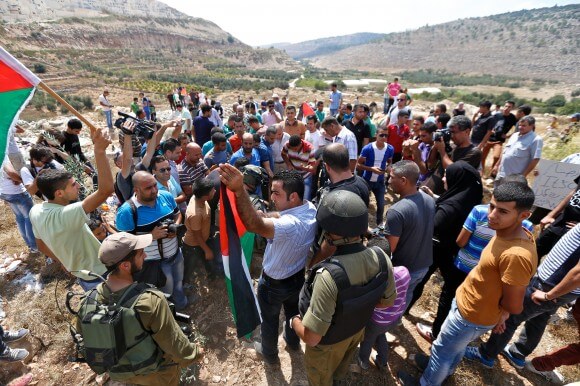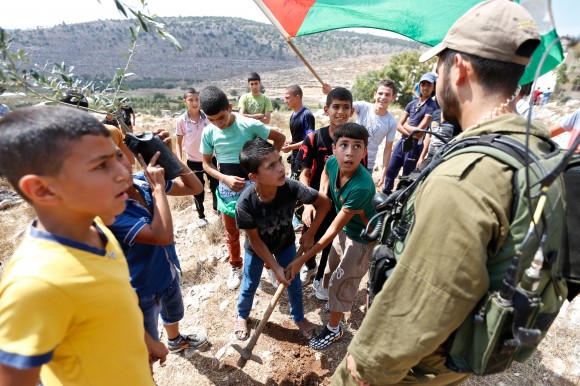Wadi Fukin may be the smallest of the five villages threatened by Israel’s recent mass land grab, but these days it’s certainly not the quietest.
Leaders in the village of approximately 1,250 have galvanized locals into organizing Friday demonstrations against Israeli occupation for the first time in years, after 4,000 dunams (nearly 1,000 acres) in the southern West Bank was declared “state land,” by Israel. Over a quarter of the confiscated land belongs to Wadi Fukin, which already lost most of its property to the still expanding Israeli settlements of Beitar Illit and Hadar Beitar in the north and Tsur Hadassah in the west after 1967.
“They are planning to make us an island with the settlements surrounding us on all sides,” says Ahmad Sukar, head of the village council. He laments the effect the occupation has had on the small farming community, citing armed settlers who come to picnic in the village’s only playground, or swim in the reservoirs used to irrigate crops.
“These days we are working in two ways. First within the law and the courts. Second, we are protesting to send a message to everyone – settlers, Israelis, Arabs – to show them how we live in Wadi Fukin.”

Sandwiched in a fertile valley between the Green Line and the nearby settlements, Wadi Fukin bears this recent blow in the context of a unique history. After sustaining multiple raids in 1948 by the Zionist paramilitary group, Haganah, Israeli forces completely destroyed Wadi Fukin in the early 50’s with most locals fleeing to Jordan and nearby Dheisheh Refugee Camp.
In an exceptional circumstance, villagers were given the opportunity to return to their land and rebuild in 1972 by Israeli authorities, and have since successfully restored and repopulated the village. It currently falls within Areas B and C, land under de-facto Israeli military and civil control.
On August 31st, four days after the Gaza ceasefire, residents of the Palestinian villages of Husan, Nahalin, Surif, Jabah and Wadi Fukin found dozens of yellow placards in Hebrew and Arabic, delineating the boundaries of the 4,000 dunams of Israeli ‘state land.’ Seen by many as an effort to placate criticism from the right of how he handled the assault on Gaza, Netanyahu announced the expropriation to a flurry of international condemnation. The land grab is the largest of its kind in three decades.
The five affected villages surround what is left of the Bethlehem governorate, some of the most aggressively settled land in the West Bank. Plans for this land include construction on an arguably new settlement; Gvaot and allow for unimpeded passage for Israelis from the Gush Etzion settlement bloc to Jerusalem.

As is typical for Friday demonstrations throughout Palestine, the first protest began after midday prayers at the village mosque on September 5th. Israeli soldiers and border police had already been positioned for over an hour on the hill where the action was to take place.
The craggy hillside has been allotted to the village’s only school, to be used as space for a playground or additional classrooms. If the land is seized and developed, locals worry for the safety of students having settlers in such close proximity and Sukar anticipates a daily presence of soldiers not unlike what schools in the neighboring village of Al Khader face.

A group of teenage girls had planted a Palestinian flag on the parcel of land before Israeli authorities removed it. Activists opted for a more permanent symbol that first Friday, painting flags onto stones while others dispersed in groups, digging holes into fertile ground and planting olive tree saplings while soldiers attempted to block their efforts. The group that pushed the farthest up the hillside was a pack of 12-year olds who successfully challenged and dismissed a soldier trying to obstruct them.

“Ardna!” they yelled. “This is our land.”
Eventually, a middle aged activist was grabbed by border police and Sukar attempted to de-arrest him, but not before being pepper sprayed in the face. Soldiers released the activist but began firing tear gas and sound grenades toward the group of roughly 80 participants, many of whom were not used to the ubiquitous use of such methods by Israeli authorities.
For at least an hour following the protest, Israeli military and border police fired canisters directly into the village where locals scrambled to deal with the unfamiliar effects of tear gas.

40-year-old Nejah Manasra was present at the demonstration with her three children safe at home. As they clamored to see the commotion from their balcony, she screamed at them across the valley to go inside.
“It’s the first time this has happened in our village. We are a peaceful village. We are a small village and you see the Israeli homes next to ours. We don’t attack them. But the Israeli [soldiers] were preparing themselves for this and waiting for a moment to attack us,” she said.
Before Israeli forces evacuated the area, they uprooted the saplings from the ground and confiscated them, along with signs reading, “Stealing land makes you a thief, not a partner for peace.”
“Our message was peaceful, that this is our land. It is our right to use it, to cultivate it,” said Sukar. “Every Friday we will have a demonstration and wherever there is a land grab, they should do the same.”

The following week on September 12th, after midday prayers, a similar crowd gathered, this time headed toward the farmland near Beitar Illit’s sewage system, which frequently dumps wastewater into a portion of the valley where farmers cultivate the fruits and vegetables Wadi Fukin is known for.
Activists chanted in English, “1-2-3-4-occupation-no-more,” while Israeli settlers watched from homogenous beige balconies stacked atop each other. Several soldiers and border police followed from a comfortable distance.
A horde of boys scaled the hill and painted additional flags, occasionally whistling at the soldiers on the adjacent hill. There was no direct confrontation with Israeli forces but the same group of teenage girls that had planted the original flag two weeks prior came to join the procession as it made its way back to the village.
“Palestine is free! Wadi Fukin is free!,” they yelled toward the settlement. Long after most activists returned home, the group of youth stayed, wrapping themselves in keffiyeh’s, chanting and pulling stones and debris onto a dirt road to blockade a possible advancing Israeli jeep.

“If we don’t go there, who is going to look at us? They have to see us,” says 15-year-old Bera’a Manasra, whose home like most in Wadi Fukin, has a sprawling view of Beitar Illit.
It’s not yet clear if the village will reap the full spectrum of consequences involved in repression of Friday demonstrations by the Israeli military or how long the protests will continue. But unsurprisingly, the youth seem the most passionate.
“This is our land. And we saw what happened in Gaza. Of course we will come back next Friday,” says Bera’a.
15-year-old Baitul sits next to her, “I will never leave,” she says.




Kelly– many, many thanks for your photos and report.
Such steadfastness in the face of such a brutal war machine.
How the US government stays silent (and worse) is to their/our eternal shame.
Meanwhile another Israeli government institution proves why it can be trusted to do right by the people it control.
(Haaretz, Sept. 12 2014) “A Palestinian prisoner who died in his Israeli prison cell earlier this week did not hang himself, as the Israeli prison service said, but was beaten to death, a Palestinian minister said on Friday.
Minister for Prisoners’ Affairs in the Palestinian Authority Issa Karaka said that according to information obtained by his ministry Raed Al-Jabari’s body displayed bruises, but not around the neck, disproving Israeli claims of suicide.”
Maan news has his cellmates’s version of events. “In the morning when we arrived to Eshel, Raed and Abu Jad were taken inside the prison and I stayed in the vehicle. 15 minutes later, one of the soldiers came and told me that Raed was dead.”
Al-Azza said that he yelled at the soldier and asked him why he had said his cellmate was dead, but “the soldier did not answer me. He hit me on my leg and shut the door of the vehicle, and then I was then taken to Ashkelon.”
Israel, thy name is “impunity.”
For decades Israel’s actions have proven they do not want a two state solution. More evidence
Omg it’s a not a land grab. The land is mostly empty, it’s just being municipally incorporated into an already existing settlement bloc that will remind part of Israel if an agreement ever materializes. The very fact that Israel even allows Palestinians to petition its court system is a credit to it.
Wadi Fukin says Wudyu Fukoff to Rabid Judaism
the Scots vote today on independence. the vote was taken for granted by the Government in London but they started to panic 10 days ago. Some instructive lessons for complacent Israeli Jews regarding popular will and historical trends here
http://www.ft.com/intl/cms/s/2/df8e3328-34df-11e4-ba5d-00144feabdc0.html
Electoral outcomes are driven by fundamentals, and the cold truth about the union/Israel’s unbreakable bond with the US is that the fundamentals binding it were weakening before Mr Alexander was born 46 years ago. The British empire/Holocaust, existential threats from the continent/Middle East, Protestantism/Judaism, the armed forces/IDF morality – the first two of these great adhesives have gone, the last two are not quite what they were. The substance of the union has been thinning out since 1945/2001.
The UK/Israel is not an immutable fact of nature; it is a human design that can be undesigned when the circumstances that gave rise to it no longer obtain. The break-up of the union would be sad and a practical ordeal that would suck up years of work in both Westminster and Holyrood/DC and West Quds. But it would not be an aberration. Historical forces make it explicable.
The coward’s way out is to avoid dwelling on the underlying trends that have chipped away at the union/Zionism for half a century, and to blame a few campaign chiefs instead. This is a lousy way of understanding what is happening in Scotland/The levant , and an even worse way of preparing for political movements to come.
Trends point to the rise of English/Palestinian nationalism – already here in the disguised form of the UK Independence/Hamas scaring the shit out of Yossi I party – and demands by London/the Palestinians for more autonomy. Our obsession with the particular and the personal will blind us to these forces until they strike us in the face.
go Palestine! History is on your side